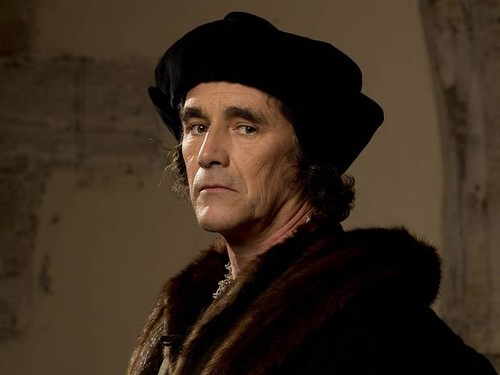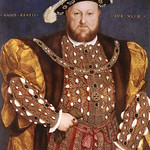The Red Menace Watches: Wolf Hall
 Around these parts I am probably not the first lady you'd expect to be writing about a period drama. I'm not even a likely suspect for reviewing television in general. But I knew as soon as I heard that they were making a Wolf Hall miniseries for Masterpiece that I wanted to watch it and that I wanted to write about it, because that book haunted me.
Around these parts I am probably not the first lady you'd expect to be writing about a period drama. I'm not even a likely suspect for reviewing television in general. But I knew as soon as I heard that they were making a Wolf Hall miniseries for Masterpiece that I wanted to watch it and that I wanted to write about it, because that book haunted me.
For those who don't know, the book, written by Hilary Mantel, is set in 16th century England during the reign of Henry VIII. It's the first in a trilogy chronicling the meteoric rise and subsequent fall of Thomas Cromwell, chief minister to Henry, engineer of the Reformation, and political schemer extraordinaire. Generally speaking historical fiction isn't a genre I gravitate toward - I like my books set in castles to have more of a fantastical bent. But I was drawn to Wolf Hall because I am a huge fan of Hilary Mantel's other novels and, more particularly to her memoir, Giving Up the Ghost.
In the memoir, Mantel writes beautifully but without sentiment about her post-war English childhood, which she spent convinced she would master the arts of "chivalry, horsemanship, and swordplay," and very likely transform into a boy. This belief was bolstered by the strange hallucinations she suffered from - shimmering phantoms and barely-there figures, including one she believed with absolute certainty was the Devil himself. While this turned out simply to be auras caused by migraines, Mantel's troubles were far from over - as she aged, she also became host to a terrible pain and unexplained weight gain, which her doctors insisted was psychosomatic and treated with heavy anti-psychotics and psychiatry.
By the time she correctly diagnosed herself with endometriosis, a disease in which tissue that normally grows inside the uterus grows outside the uterus, attaching itself to random organs in the body, it was too late to do anything preventative - she needed radical surgery which left her unable to have children. These experiences, these visions and pains and mistreatment at the hands of men with more power than her show up time and again in her novels, which she began writing as a form of recovery. I was extremely interested to see how they would play out in Wolf Hall, which on the surface is very much a man's story.
As it turns out, while it is indeed that, Mantel uses the story of Thomas Cromwell to do so much more - she uses him to examine crises of faith, in the form of his work to reform the Catholic Church. She uses him to explore the position of the perennial outsider - Cromwell was low-born, the son of a blacksmith, and was never an easy fit in the Tudor court. And finally, I would argue, the history of Thomas Cromwell and the entire story of Henry and all of his wives and the Reformation are very much a story of devastating consequences for women who can't have children - or at least, the right kind of children - because the whole affair kicks off with Catherine of Aragon's inability to give Henry a son. (Though as we know now, that had more to do with his contribution than hers.) In many ways, Wolf Hall is the quintessential tale of how the personal is indeed the political.
And I read it, and I loved the book - Mantel's language is rich and gorgeous, with sentences that ring in the head for days - (She describes Stephen Gardiner, one of Cromwell's rivals, this way: "It's wet, and for a night in April, unseasonably warm, but Gardiner wears furs, which look like oily and dense black feathers; he stands now, ruffling them, gathering his clothes about his tall straight person like black angel wings.") - but I also struggled with it. Mantel plays the long game with this book and at times it felt as though I were watching history unfold in real time. So I wondered if the miniseries could move the story along a bit faster, without sacrificing the art of the novel.
And while obviously you lose Mantel's incredible descriptive language in favor of lush costumes and sets, after the first episode the series is looking strong. The cast is amazing - Mark Rylance manages to convey the contradictory charisma, menace, and familial devotion of Thomas Cromwell, Claire Foy the petulance and cleverness of Anne Boleyn. Damian Lewis, meanwhile, pulls off the charm, arrogance, and yes, the seductiveness of Henry VIII, a king we remember for his corpulent latter years, dismissing the fact that he was quite the lady killer (ha ha) in his younger ones.
The sets and costumes are impeccable, even if everyone seems rather more clean than they would be in real life, and the script is also great, maintaining much of the sly, dry humor that makes Mantel's work so fun to read. The storyline jumps back and forth quite freely in time, so be sure to pay attention to the helpful text explaining setting and date to avoid pointless confusion.
While I do think the miniseries will advance the plot more quickly than the novels, this is still a measured, serious story - it doesn't have the sexy antics of something like The Tudors, or the swordplay (and sexy antics and dragons) of Game of Thrones. But if you're looking for a well-written, well-acted period drama with a bit of substance, Wolf Hall might be for you. If you watch or read it, let me know what you think in the comments! If you don't think it's for you, just read this piece from The Toast instead - it should still give you everything you need.




